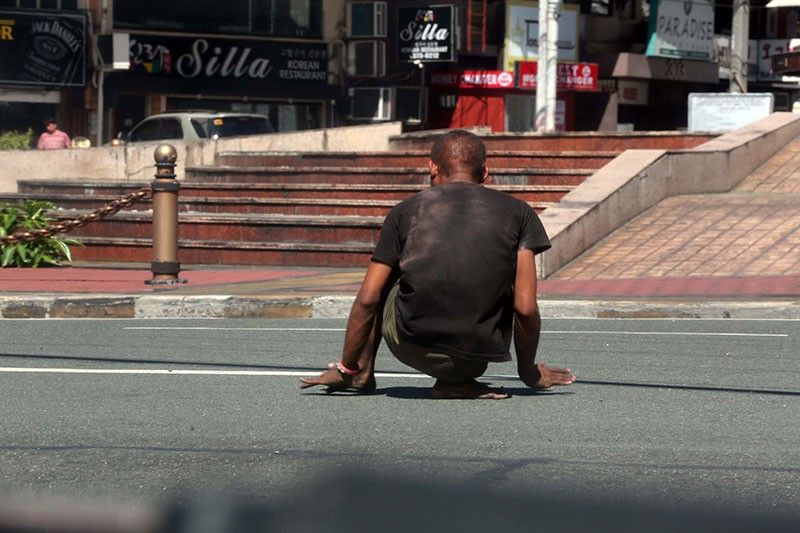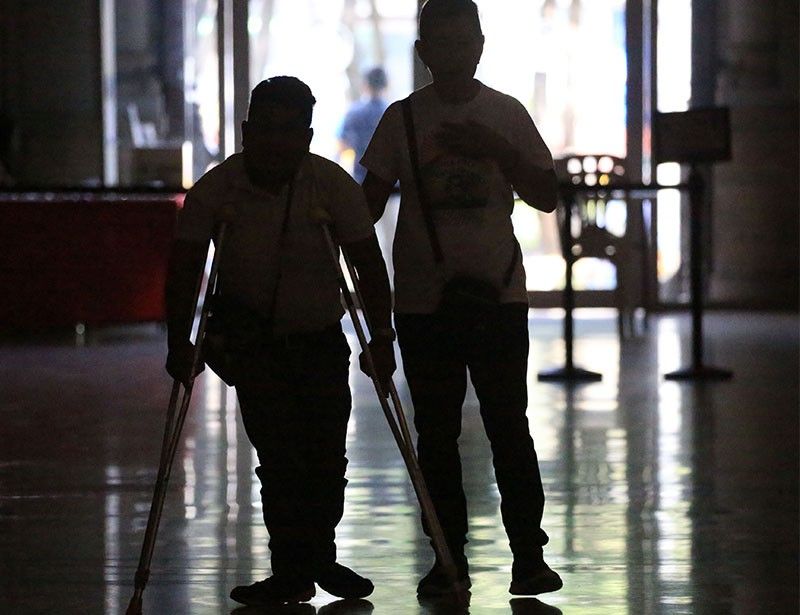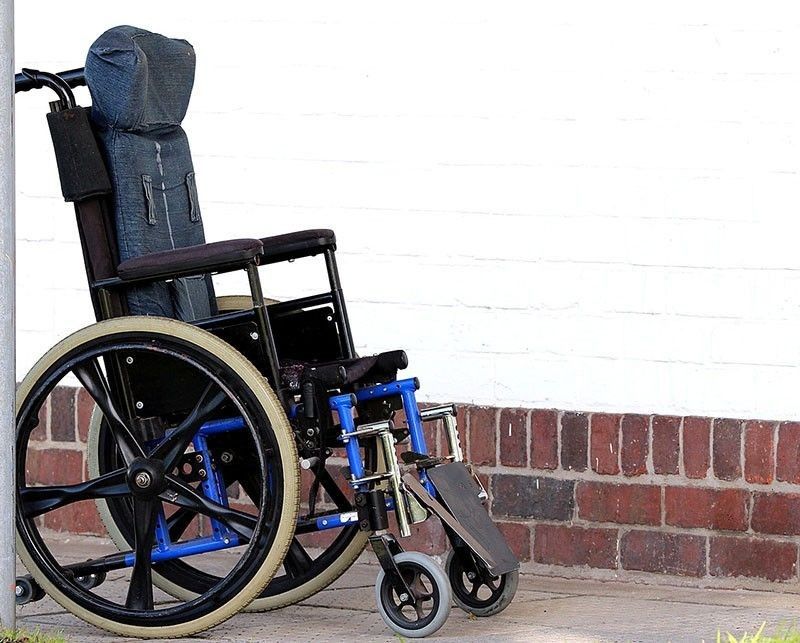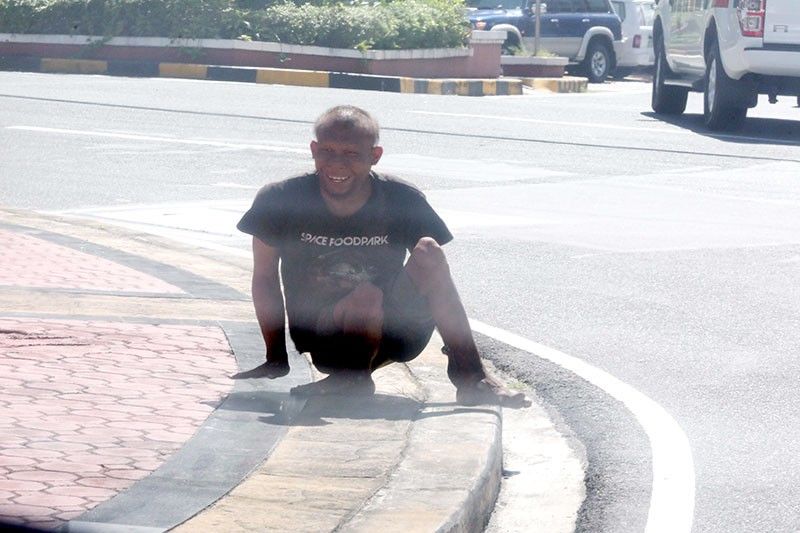Social distancing's victims: In a Luzon quarantine, the disabled are mostly forgotten

MANILA, Philippines — At least twice a week, Maria (not her real name) makes the effort to commute for half an hour with her two children—an 11-year-old and a 6-year old—in a barangay in San Pedro, Laguna.
Through long lines and cramped rides, the entire trip into town takes over half an hour, but it’s been an essential struggle: her kids, after all, are both classified as special needs children and persons with disability (PWDs).
Her eldest has cerebral palsy while her youngest has ADHD. Both of them go through therapy sporadically, but only when they can afford it. When they can’t, Maria has to endure epileptic seizures and constant tantrums at home, which she says has taken a toll on her. But this is life as usual for their family.
Under the Luzon-wide lockdown-esque quarantine, relief is no longer a possibility. For the time being, this will have to be the norm in her household.
Even with a heart sickness limiting how much she can carry, Maria says the physical strain and the mental fortitude needed to adjust to her children’s moods and needs are not a problem—she’s been their guardian for this long, after all.
But what she does lose sleep over is how long their provisions can last, and what to do next if they don't.
Some of us won’t return to normal life once #CoronavirusOutbreak ends. They haven’t been able to participate in daily life activities that we take for granted. It is time that #PWDs in #Lebanon are fully included in our communities.
— Jaafar Fakih (@FakihJaafar) March 18, 2020
"Hanggang ngayon, wala pong binibigay ng barangay o mayor’s office ng subsidy kung saan kami kukuha," she tells Philstar.com in an interview.
For a nation whose charter claims to uphold the rights of the disabled, quarantines have largely left the Filipino poor in uncertainty, particularly informal workers for whom staying at home was not an option, along with those who do not have homes to self-isolate to begin with.
'Cannot be left by themselves'
Over the past week, President Rodrigo Duterte announced stricter restrictions as the alert over the novel coronavirus (COVID-19) was raised to Code Red Sublevel 2, including an enhanced community quarantine over mainland Luzon, more serious social distancing measures, and a nationwide state of calamity.
According to the US Centers for Disease Control and Prevention, social distancing means "remaining out of congregate settings, avoiding mass gatherings, and maintaining distance (approximately 6 feet or 2 meters) from others when possible."
In the Philippines, measures pushing for heightened social distancing have left the country's vulnerable falling through the cracks, and advocacy groups for the disability community don't think such a measure is feasible for PWDs.
Asked by Philstar.com if social distancing was possible for PWDs, Arpee Lazaro, president of advocacy group PWD Philippines, said, "That's definitely a no."
"Yung mga naka wheelchair, children with autism, and others with psychosocial disabilities cannot be left by themselves kasi yung distance makes them vulnerable at baka magpanic lalo na mga bata," Lazaro said.
READ: Why some are saying social distancing is a privilege
"Others with orthopedic and visual disability kailangan din nila ng inaakay, especially the blind."
(The ones in wheelchairs, children with autism, and others with psychosocial disabilities cannot be left by themselves because the distance makes them vulnerable and this could trigger more panic from the children. Others with orthopedic and visual disability need guidance too, especially the blind.)

Maria says she's witnessed this firsthand.
Her youngest, she says, is starting to throw tantrums more and more, and his outbursts are getting harder to control.
This is only half the problem, too. She was also able to set aside some medicine for her eldest son's epilepsy, which he's supposed to take twice a day, but she fears it might not be enough to last through the quarantine.
If he goes too long without his medicine, he may incur irreversible nerve damage, and eventually, paralysis.
She said she was trying to delay this as much as she could by regularly massaging him, something not easy to do with his temper.
"Kung hindi siya maka-inom ng gamot, baka may mabawas sa kaniya. Imbis na dati na gumagalaw ang mga kamay niya o gumagalaw ang mga paa niya, eh baka ma-epektuhan po," she says.
"Imbis na lumambot na yung mga muscle niya, titigas po ulit iyon, kung baga hindi gumagalaw."
With the absence of public transportation cutting off access to expensive therapists, she's also resorted to mimicking her other son's routines in home therapy to the best of her abilities, and to mixed results.
Even with all this, Maria considers herself lucky in comparison to other PWDs.
"Kung ako po ay nakapagtabi ng kaunting gamot, paano na yung iba na PWD namin na sa pang araw-araw lang sila?" she says. "Paano yung iba na wala talagang pagkukunan? Baka within 1 or 2 weeks, wala na silang makain dahil sa quarantine."
Disability in the time of coronavirus
In the Hubei Province of China, where the epicenter of the virus is located, a 17-year-old boy with cerebral palsy was abandoned at home when his father was taken for quarantine in February.
For an unknown amount of time, he was confined to a wheelchair the entire time, unable to speak, walk or eat by himself.
READ: Disabled Chinese boy dies while father in virus quarantine
The young boy eventually starved to death. His tragic passing cost many government officials their jobs.

Elsewhere in that same province, a 6-year-old boy was found alone in his apartment clutching the dead body of his grandmother, as reported by The New York Times.
Within the disability community, groups fear that the same could happen should the situation be treated the same way.
Even the United Nations has spoken up about the disabled amid the global pandemic: in a statement issued on Tuesday, UN Special Rapporteur on the rights of persons with disabilities, Catalina Devandas highlighted that little has been done to protect the rights of the disability community.
"People with disabilities feel they have been left behind," the human rights expert said.
"Containment measures, such as social distancing and self-isolation, may be impossible for those who rely on the support of others to eat, dress and bathe."
Since President Rodrigo Duterte placed mainland Luzon under enhanced community quarantine, trains, jeepneys, public buses, taxis and even ride-hailing applications have been suspended.
READ: No mass transportation amid 'enhanced community quarantine' in Luzon
For the already-vulnerable, just getting themselves to proper healthcare and assistance will be a problem, and the lack of proper facilities is a disability of its own.
In a text message to Philstar.com, Transportation Assistant Secretary Goddess Hope-Libiran said, "We encourage the public, especially our senior citizens and PWDs to just stay at home and avoid commuting."
"We do not want them to be more exposed to the virus. This is for their own safety," she added.
Social media has been rife with reports of cancer patients who have had to walk to hospitals on their own to receive chemotherapy treatment.
To make matters worse, hospitals have long been focused almost solely on the worsening outbreak, leaving little attention for those coming in for therapy and maintenance.
READ: Health workers walk to work, sleep in clinics as quarantine halts transportation
"Because of the emergencies and limited manpower, patients are discouraged from seeking consults in outpatient departments," Coalition for People's Right to Health co-convenor Josh San Pedro told Philstar.com in an online exchange.
"For one thing, these people with chronic comorbid diseases are also more likely to be immunocompromised and are thus more at risk for catching and having severe cases of COVID-19."

In a 2017 study by the Philippine Institute for Development Studies of 1,031 adult women and 823 children with disabilities in two cities, majority of respondents were found to be mobility-impaired (39.7%) while many others had development/psychosocial afflictions (28.7%).
Cancer patients, or persons living with cancer and cancer survivors are also considered as PWDs by virtue of Republic Act No. 7277 or the Magna Carta for Disabled Persons.
"Wala po kaming ideya kung mayroon kaming matatanggap kahit yung senior citizen o kaming PWD. Wala pa po kaming naririnig na statement," Maria said.
"Tungkol sa kalagayan ng PWD, wala pong nagtatanong."
Between a rock and a hard place
According to a 2010 census, there were 1.44 million Filipinos in the country living with a disability, a number accounting for 1.57% of the total population that year, while a 2016 study by UNICEF estimated that there were 3.3 million children with disabilities in the Philippines, more than doubling the number from six years before.
Although no statistics exist on homeless disabled people, the Philippine Statistics Authority has recorded about 4.5 million homeless people in the country, with 3 million of them living in Metro Manila.
"Even seniors cannot be without a companion," Lazaro added.
"Social distancing will have to exempt them."
But healthcare workers have sworn by the new tactic, which has seen a number of countries the world over go into voluntary lockdowns of their own.
In Wuhan, for instance, the number of new cases recorded daily has gone down drastically since the city went into lockdown.
As it stands, this leaves the disabled and the elderly—both likely immunocompromised groups—caught firmly between a rock and a hard place: if they break quarantine, they risk transmission of the pathogen, which has proven to be more dangerous in adults over 60 who are already sick.
If they do observe quarantine measures, they risk aggravating their existing conditions without receiving the proper attention.
For now, Maria will have to observe the quarantine for the sake of her children.
"Kasi kung ganyan na ang kalagayan nila at magkakaroon pa sila, paano na kaya? Wala na kaming magagawa," she says.
While the affluent and the capable can comfortably sit through the month-long quarantine safely, the vulnerable are not so lucky. A 2018 study from the Philippine Institute of Development Science (PIDS) said that Filipino households with disabled children spend 15 percent of their income for health expenses every year.
The PIDS study reads:
“An average annual health-care expenditure of PWD [person with disability] children of P15,225.66 is a significantly huge burden for some of the PWD households, particularly those who fall below the poverty line."
In a video address on Tuesday, Vice President Leni Robredo called attention to those left even more disadvantaged by the quarantine. In separate video addresses this week, she echoed the same message: "Protect the vulnerable."
Pasig City Mayor Vico Sotto has also been vocal about patients unable to receive medical attention, asking the government to allow tricycles in the city to transport health workers and patients alike. He was told to "be more creative" with his approach to the virus.
READ: DILG on Vico Sotto's appeal to exempt trikes: Be more creative in dealing with COVID-19
Irene B. Dumlao, OIC-Director of the Department of Social Welfare and Development's Social Marketing Service told Philstar.com that the department had programs for the two groups during the quarantine. This was after it was initially reported that it would be pulling the plug on its subsidy program for indigents.
Though these initiatives are being rolled out on the government level, low-income families with PWDs have long said that they hardly feel it on the ground.
Is social distancing possible for the disabled and the elderly?
For the time being, the disabled and the elderly are just among the many other vulnerable Filipinos left reeling from the forced quarantines, which also include commuters, informal workers and health workers on the frontlines.
The United Nations in its statement called for its member-states to initiate the following measures for disabled citizens "to enable people with disabilities to reduce contacts and the risk of contamination" amid the coronavirus outbreak:
- They should be allowed to work from home
- They should receive paid leave to guarantee their income security
- Family members and caregivers may also require reasonable accommodation to provide support to people with disabilities during this period.
- Persons with disabilities deserve to be reassured that their survival is a priority
- Establish clear protocols for public health emergencies to ensure that, when medical resources are scarce, access to healthcare, including life-saving measures, does not discriminate against people with disabilities
- Public advice campaigns and information from national health authorities must be made available to the public in sign language and accessible means, modes and formats
"Access to additional financial aid is also vital to reduce the risk of people with disabilities and their families falling into greater vulnerability or poverty," she explained.
"Many people with disabilities depend on services that have been suspended and may not have enough money to stockpile food and medicine, or afford the extra cost of home deliveries."
READ: Told to stay home, Filipino poor go out to work absent government aid
"The problem is some agencies are not acting with regard to this," San Pedro said.
"I think we have to continue other social protection mechanisms in order to not cause another crisis later on."
"Dapat po tayong mga may kapansanan at mga senior citizens exempted sa social distancing," PWD Philippines wrote on its official Facebook page.
(We people with disabilities and senior citizens should be exempted from social distancing.)
As of this writing, there are some 156,000 confirmed patients of COVID-19 globally.
"Mahirap maging PWD," Maria says in tears. Asked if her children's conditions could worsen because of the quarantine, she says, "Sana naman po hindi, sisikapin ko para magiging okay sila." — with report from Agence France-Presse
- Latest
- Trending































